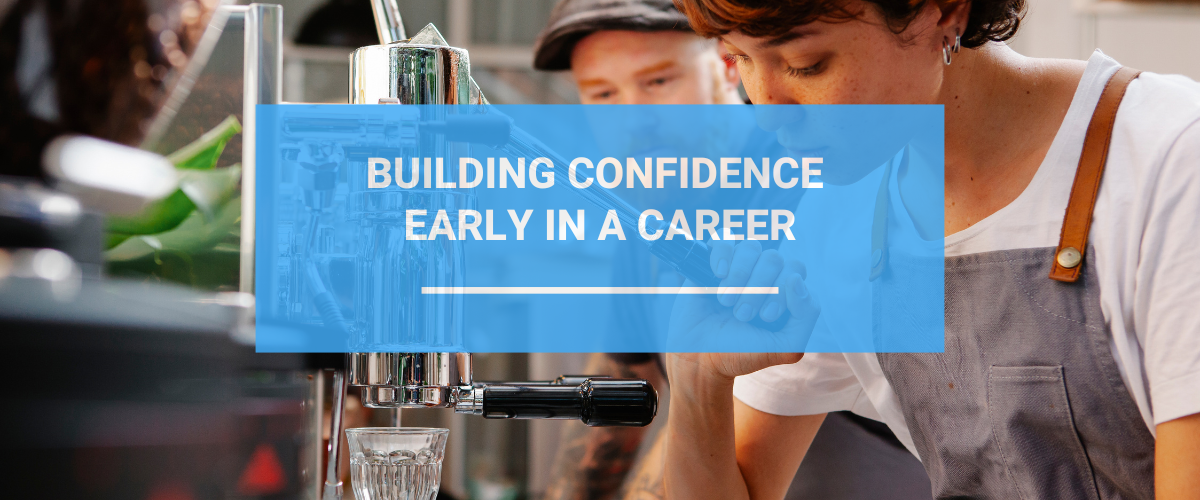Building confidence early in a career

Paul Marden

No one wants a nervous barber. I’ve said this to new recruits, especially apprentices, for at least the last 10 years.
Why? Because if your barber comes at you with a cut throat razor using nervous shaky hands, you’ll probably be rightly concerned for your safety.
Barbering is a service industry just like a tech agency, and I've long been convinced confidence is a key part of our service standard. We aim to be confident, authoritative, knowledgeable, supportive and friendly in all our interactions. We call this “Waitrose-like Customer Service”, and it's an important part of what we aspire to deliver day in, day out.
We do a lot of work to train and develop during early careers including Apprenticeships and more recently T-Level Placements, so encouraging people to be confident, and selecting candidates based on their confidence and life experience rather than their technical skills has been a crucial part of our Apprenticeship Scheme.
But listening to two podcasts this weekend got me thinking about the importance of developing confidence skills.
Firstly Lloyd Knowlton on Business Anchors gave a q&A session where one listener asked him what the one biggest learning since starting his agency. Lloyd reflected recently on his experience that the best ideas and best work comes from the quietest person in the room. He pointed out that as employers we are often attracted to more confident people at interview, but he said "There is zero correlation between confidence and ability."
This is valuable advice for me, a naturally extroverted introvert who in many meeting situations can be very confident.
So with that in mind, I'll be thinking a little harder to challenge my bias. But at the same time can those who are less confident in interviews and meetings find ways to challenge their behaviour to better exploit the default bias towards confidence?
The second podcast I listened to serendipitously talked about confidence as well. In the interview my good friend Kelly Molson met Bala McAllin on Skip the Queue. Bala is an ex-actor who started a business which trains front of house teams at visitor attractions to become more confident storytellers. What Balla said resonated with me: "Experience leads to confidence and confidence leads to good practice…whatever task it is, you need to build experience.”
So rewind to developing confidence in early careers, can you learn to become more confident if that's not your default mode in situations like meetings and interviews?
I think you can, and it will make working life easier during the early stages of your career if you put in the effort early.
So expose yourself to more experiences of work that require you to interact with people: Get a part time job; volunteer with a local charity; become a marshal at festivals; take part in competitive team sports - be imaginative about finding ways to expose yourself to challenging situations with members of the public.
In the recent Conservative Party Leadership race much was made of the humble roots of Kemi Badenoch, having flipped burgers in McDonalds, a lot of it in a tone I wasn’t impressed by. Because having worked in Wimpy, McDonalds, and bars between the age of 16 and 21, I know that all of that customer service experience stood me in good stead when I started my career.
If the first time you have an interview is for the graduate job you've longed for all your life, then you may lack the experience to be confidently “in the moment” during the interview. If you're three jobs down already by the time you make it to interview for that apprenticeship or graduate role you're after then you'll have at least 3 interviews that you've aced (and probably a good number you've flunked). So you can focus more on the human interactions and less on the mere mechanics of how to handle an interview.
If the first time you make a mistake at work is in that same job you really want, the pressure is so much higher. Three McJobs down the road, you'll have made enough mistakes at work to recognise that we all make them and you'll have built resilience that enables you to confidently take manageable risks at work.
If the first time you speak to a customer is in your graduate job, then the lack of experience will make it more challenging to solve their problems, as you don’t have the experience of successfully navigating the customer / supplier relationship.
I know I'm going to work to fight my bias, but in a world that favours the confident, volunteering and part time jobs build valuable life skills enabling you to build resilience to failure, understand how to interact with people you don't know, and learn the basic habits of work.
Then when you land that amazing early career role be it an Apprenticeship or a Graduate role, you'll be match fit. You'll still be nervous, but you'll be able to devote more conscious energy to being in the moment, learning your craft, working with colleagues and helping customers.

